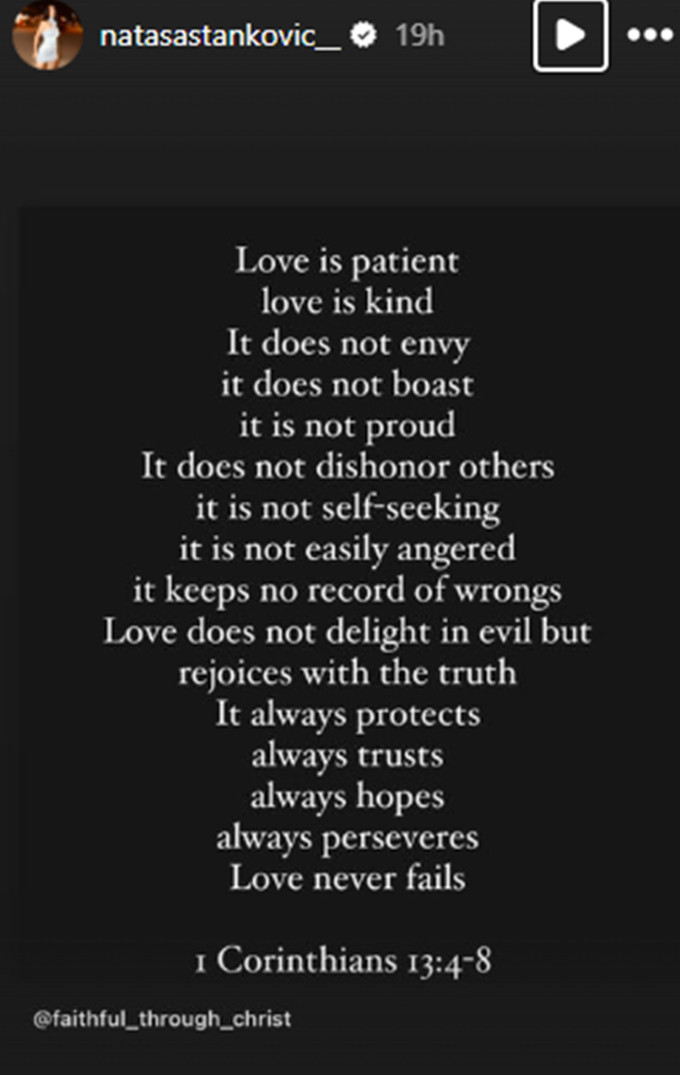Natasa Stankovic shares cryptic note about love after divorce from Hardik Pandya: How to let go of grudges after failed relationships
When relationships end, the emotional aftermath can be challenging to navigate. Serbian model Natasa Stankovic, who recently announced her divorce from cricketer Hardik Pandya, shared a cryptic note on Instagram about love.
This comes after a source close to the couple revealed to Times Now that Stankovic could not handle Pandya’s “flamboyant” and “self-centered” attitude, which led to them going their separate ways.

She quoted the timeless words in an Instagram story, “Love is patient. Love is kind. It does not envy. It does not boast. It is not proud. It does not dishonour others. It is not self-seeking. It is not easily angered. It keeps no record of wrongs. Love does not delight in evil but rejoices with the truth. It always protects, always trusts, always hopes, always preserves. Love never fails.”
 Natasa Stankovic shared the post on Instagram (Source: Instagram/Natasa Stankovic)
Natasa Stankovic shared the post on Instagram (Source: Instagram/Natasa Stankovic)
Healing after a failed relationship often requires more than just time; it involves a conscious effort to release negative feelings and move forward. But how does one truly let go of the hurt and resentment that can linger? And what steps can be taken to ensure that these emotions don’t interfere with future relationships?
Malika Chandra, psychotherapist at MC Psychotherapy, says, “Letting go of a failed relationship is never easy. It completely alters what you envisioned for your future, leaving you to grieve the loss of not only what was, but also what could have been.”
Effective strategies for letting go of grudges and moving past conflicts after a relationship ends
According to Chandra, one can let go of the hurt and resentment that can linger after a relationship ends by using the following strategies:
– Move past something is to go through it! As paradoxical as it may be, you will do your best work at your worst lows. Allow yourself to feel negative and unpleasant emotions and try to sit with them.
– Allow yourself some cognitive flexibility and try to empathise with the person and also with yourself when you rethink the situation.
– It may be uncomfortable to sit in the grey area, but try to separate your empathy from your boundaries. It is alright to understand where someone is coming from and still not be okay with their behaviour towards you.
– Exercises from Cognitive Behavioural Therapy are useful as well. You could use CBT exercises online or in therapy to understand your implicit beliefs that may be guiding how you think and feel.
Differentiating between normal grieving process and holding onto unhealthy feelings of resentment
According to Chandra, the normal grieving process can look different for each person. It may involve feelings of anger, sadness, loneliness, resentment etc. One may not engage in hobbies or social activities as much as they used to. A person can also become withdrawn or excessively engaged so as to distract themselves.
She adds, “Unhealthy resentment can show up as black and white thinking. This is usually a sign of unprocessed trauma. The other sign of unhealthy coping may be an overly positive attitude and lack of any signs of grieving. This could indicate that the person may be suppressing their emotions and can have longer lasting negative effects.”
 Try to separate your empathy from your boundaries (Source: Freepik)
Try to separate your empathy from your boundaries (Source: Freepik)
Role of forgiveness
Forgiving is the ultimate stage of letting go, Chandra tells indianexpress.com. It has immense psychological, emotional and physical positive effects for the person who forgives. “However, it is important to understand that forgiveness is the last part of the process, and you are at the centre of this process. It is also important to forgive yourself and be empathetic towards yourself.”
Holding onto grudges and the ability to form healthy connections in the future
Holding on to grudges can impact future relationships. When you are holding on to grudges, there is something that is left unprocessed. To not let it affect your present, you have to find ways to process the past. This involves your emotions first, and then your beliefs.
Chandra informs, “Trauma involves an unexpected change in the beliefs that you held previously, such as ‘I will be with this person forever’ or ‘If I am a certain way in my relationships, my partner will not leave me’. Such underlying beliefs may be subconscious and cause unpleasant feelings and possibly incongruent thoughts. Healing on the other hand involves reintegration of new beliefs back into your psyche such as ‘I may do my best and the relationship may end for other reasons’.”
📣 For more lifestyle news, click here to join our WhatsApp Channel and also follow us on Instagram
Disclaimer: The copyright of this article belongs to the original author. Reposting this article is solely for the purpose of information dissemination and does not constitute any investment advice. If there is any infringement, please contact us immediately. We will make corrections or deletions as necessary. Thank you.
